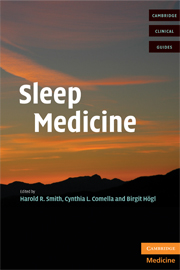Book contents
- Frontmatter
- Contents
- List of contributors
- Foreword
- SECTION 1 NORMAL SLEEP
- SECTION 2 SLEEP DISORDERS
- SECTION 3 SLEEP IN SPECIALTY AREAS
- 9 Sleep and neurologic disorders
- 10 Sleep and psychiatric disorders
- 11 Sleep and medical disorders
- 12 Sleep and pediatrics
- 13 Sleep and geriatrics
- 14 Forensic sleep medicine issues: violent parasomnias
- Index
- References
10 - Sleep and psychiatric disorders
from SECTION 3 - SLEEP IN SPECIALTY AREAS
Published online by Cambridge University Press: 08 August 2009
- Frontmatter
- Contents
- List of contributors
- Foreword
- SECTION 1 NORMAL SLEEP
- SECTION 2 SLEEP DISORDERS
- SECTION 3 SLEEP IN SPECIALTY AREAS
- 9 Sleep and neurologic disorders
- 10 Sleep and psychiatric disorders
- 11 Sleep and medical disorders
- 12 Sleep and pediatrics
- 13 Sleep and geriatrics
- 14 Forensic sleep medicine issues: violent parasomnias
- Index
- References
Summary
Introduction
Psychiatric disorders, in particular mood and anxiety disorders, are among the most common causes of sleep disturbances. According to previous studies, mental disorders have been reported in 35–53% of persons suffering from insomnia. In addition, longitudinal data show that insomnia sufferers are at increased risk for depression, anxiety disorders, and substance abuse. However, it is assumed that psychiatric disorders in those with sleep disturbances are often overlooked. Thus, exploring the individual's psychiatric history and obtaining current psychiatric findings is imperative for the diagnosis of sleep disturbances. Since, in general, the severity of sleep disturbances tends to correlate with the severity of the underlying psychiatric disorder, improved sleep is often indicative of an improvement in the psychiatric disorder. Sleep disturbances, especially insomnia, may be caused by a broad range of psychiatric disorders, in particular by mood and psychotic disorders, anxiety disorders, dementia, substance-related and personality disorders. However, there exist only a few systematic studies on the frequency of insomnia accompanying psychiatric diagnoses.
Mood disorders: depression and mania
Epidemiology and clinical features
The lifetime prevalence for mood disorders is estimated between 2% and 25% (major depressive disorder prevalence of 15% and up to 25% in women) and does not differ between ethnic groups. The 1-year incidence of depression is estimated between 10% and 15%. The etiology of mood disorders is not known, but a disturbed interplay between biological, genetic, and psychosocial factors plays an important role in the cause of mood disorders.
Keywords
- Type
- Chapter
- Information
- Sleep Medicine , pp. 170 - 185Publisher: Cambridge University PressPrint publication year: 2008
References
- 4
- Cited by

